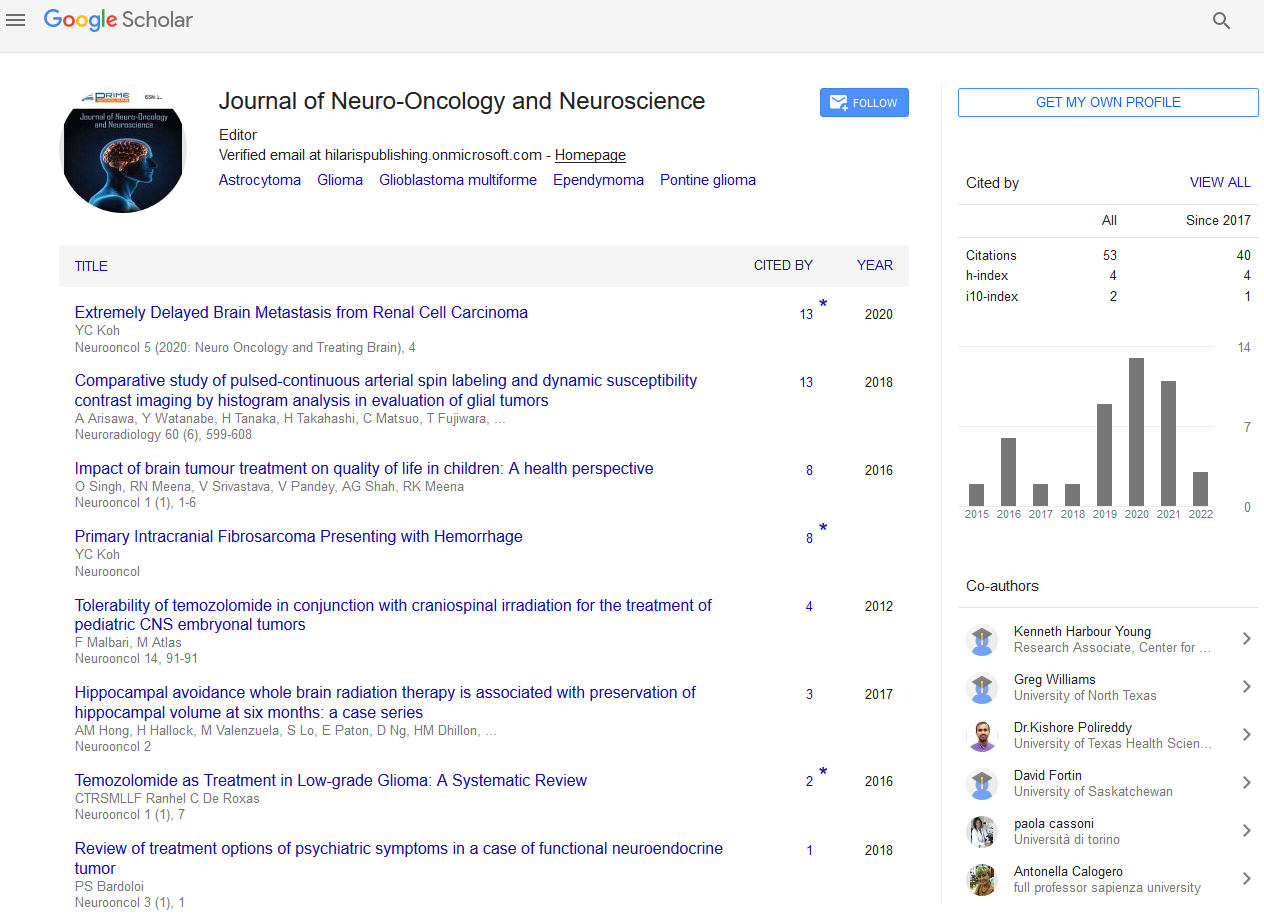Commentary - (2024) Volume 9, Issue 2
Immunotherapy for Brain Tumors: Current Status and Future Directions
Maria Dwayne*
Department of Sciences, University of Arizona, United States
*Correspondence:
Maria Dwayne,
Department of Sciences, University of Arizona,
United States,
Email:
Received: 29-May-2024, Manuscript No. IPJNO-24-20753;
Editor assigned: 31-May-2024, Pre QC No. IPJNO-24-20753 (PQ);
Reviewed: 14-Jun-2024, QC No. IPJNO-24-20753;
Revised: 19-Jun-2024, Manuscript No. IPJNO-24-20753 (R);
Published:
26-Jun-2024, DOI: 10.21767/2572-0376.9.2.19
Introduction
Immunotherapy has emerged as a promising approach in the
treatment of brain tumors, aiming to harness the body’s immune
system to fight cancer cells. This innovative field has shown
significant advancements and offers new hope for patients with
brain tumors, particularly glioblastoma multiforme the most
aggressive and lethal form of brain cancer. Checkpoint inhibitors
are one of the most well-known forms of immunotherapy. In
brain tumors, agents like pembrolizumab and nivolumab have
been explored. However, their effectiveness in GBM has been
modest compared to other cancers, likely due to the unique
microenvironment of brain tumors and the blood-brain barrier
that limits drug delivery. Chimeric Antigen Receptor (CAR)
T-cell therapy involves modifying a patient’s T-cells to express a
receptor specific to cancer cells.
Description
Oncolytic viruses selectively infect and kill cancer cells while
stimulating an immune response against the tumor. DNX-2401,
an engineered adenovirus, has shown encouraging results
in early-phase trials for GBM, with some patients achieving
long-term survival. These viruses can also be engineered
to express immune-stimulatory molecules, enhancing their
therapeutic effects. Despite the promising advancements,
several challenges remain in the effective application of
immunotherapy for brain tumors. The BBB is a major obstacle,
limiting the delivery of immunotherapeutic agents to the brain.
Strategies to transiently disrupt the BBB or develop agents that
can cross it are under investigation. The microenvironment
of brain tumors is highly immunosuppressive, characterized
by regulatory T-cells, myeloid-derived suppressor cells, and
other factors that inhibit immune responses. Overcoming
this immunosuppression is critical for the success of
immunotherapies. GBM and other brain tumors exhibit
significant genetic and phenotypic heterogeneity, making
it challenging to target all tumor cells with a single therapy.
Combination therapies and personalized approaches are
being explored to address this issue. Combining different
immunotherapeutic strategies or integrating immunotherapy
with traditional treatments like radiation and chemotherapy
holds promise. For instance, radiation can increase the visibility
of tumor cells to the immune system, potentially enhancing the
effects of checkpoint inhibitors. Innovative delivery systems,
such as nanoparticles and focused ultrasound, are being
developed to improve the delivery of immunotherapeutic
agents across the BBB. These technologies could enhance the
efficacy and reduce the side effects of treatments.
Conclusion
Immunotherapy represents a transformative approach in the
fight against brain tumors, with several promising strategies
currently under investigation. While challenges remain,
ongoing research and technological advancements hold the
potential to significantly improve outcomes for patients with
brain tumors. The future of neuro-oncology will likely see
a more personalized and integrated approach, combining
immunotherapy with other treatments to achieve better
control and possible eradication of these devastating diseases.
Engineering CAR T-cells to overcome the immunosuppressive
environment of brain tumors is a promising approach. This
includes designing CAR T-cells that secrete cytokines to
modulate the tumor microenvironment or using gene editing
techniques to enhance their efficacy.
Acknowledgement
None.
Conflict Of Interest
The author declares there is no conflict of interest in publishing
this article.
Citation: Dwayne M (2024) Immunotherapy for Brain Tumors: Current Status and Future Directions. Neurooncol. 9:19.
Copyright: © 2024 Dwayne M. This is an open-access article distributed under the terms of the Creative Commons Attribution License, which permits unrestricted use, distribution, and reproduction in any medium, provided the original author and source are credited.

